- Home
- Brandon Mull
Tales of the Great Beasts
Tales of the Great Beasts Read online
Cover
Crown Emblem
Greencloak Letter
Quote Page
Title Page
Map
Kovo
Rise of the Reptile King
Jhi
Yin and Yu
Uraza
The First Greencloak
Briggan
The Packleader
Essix
Fall of the Four
Online Game Code
Sneak Peek
Spirit Animals Game
Copyright
By Nick Eliopulos
FELIANDOR, BOY KING OF STETRIOL, PEERED INTO THE shadows, pondering his next move. The ocean was at his back. Before him, a dark forest, and his destiny.
He dug the toe of his boot into the sand and thought of his troubled kingdom. From a hidden pocket in his travel cloak, he pulled out a small glass vial, empty except for a meager drop of amber liquid. He turned the vial in his fingers and watched the droplet catch the fading sunlight.
This liquid held the power to change . . . everything.
It was called the Bile.
Feliandor’s father had been a good king, and Feliandor wanted to be a good king too. It was for that reason and that reason alone that he held court. Once a week, the doors to the throne room were opened to any citizen who desired an audience with the king. It was a tradition his father had started years before, and one that had made him immensely popular. “We live in a great tower,” he’d once told his son, “but the distance between a king and his subjects should never be greater than a single voice can travel.”
And so each week, Feliandor interacted with the people of his kingdom. Usually that meant his subjects would come from far and wide to complain about petty matters while Feliandor listened carefully, nodded thoughtfully, and then offered reassuring words — and, when possible, solutions.
It did not come naturally to him, and it never seemed to get any easier. But he always had two allies beside him through the ordeal: to his left, Salen, the royal adviser, and to his right, Jorick, captain of the king’s guard. With the knowledge and power they represented, he felt that he could accomplish nearly anything.
The people seemed determined to put this to the test.
“My king, you must do something,” said the man before him now, an aging blacksmith named Gerard. He gestured to the younger man at his side. “He’s ruined my livelihood.”
The younger man, Donnat, also a blacksmith, crossed his arms defiantly. “The old man hardly needs any help there. It’s not my fault he can’t keep up with the times! The customers have spoken, and my revolutionary smithing technique —”
“Your smithing technique is pathetic!” Gerard interrupted. “You sacrifice quality for speed. Your swords would shatter against a turtle shell.”
“Now he’s resorting to slander, Your Majesty. Unless he means to suggest he’s actually attacked turtles with my wares.”
Feliandor wished he could laugh at the spectacle of two grown men acting in this way, but the hall was crowded with onlookers. If he could solve this problem, it would be proof of his wisdom and prudence — and there was no better time to appear wise than when one had witnesses.
Fel cleared his throat, and the sound echoed. The throne room was ancient and drab, a box of rough stone with narrow slits overhead to let in daylight. The walls had been adorned with colorful tapestries and the ceremonial swords and shields of kings past, but the decorations did little to brighten the gloomy space. It had always felt like a tomb to Fel. Even in happier days.
The throne itself, however, was a masterpiece. Placed upon a stone platform and crafted entirely of Stetriolan iron, the chair was embellished with the features of a half-dozen animals: the outspread wings of a great bird of prey, the patterned scales of a reptile, the clawed feet of some vicious predator. It wasn’t comfortable, but it was beautiful. And intimidating. Fel had never seen anything else quite like it, and he doubted either of the smiths before him were capable of such craft.
He turned his gaze on the older of the two, Gerard. “But he was your apprentice?” he asked.
“That’s right,” the older smith huffed. “And I thought that once I gave up on teaching him, this louse would set up shop elsewhere. Not two doors down from my anvil, which has been serving our town for generations!”
Donnat shrugged. “Every town in Stetriol has an established blacksmith. How am I supposed to earn a living if the older generation won’t get out of the way?”
“I see,” Fel said. “So there’s not enough smithing work to go around. Does that about sum it up?”
“That’s right,” Gerard said. “I’m not afraid of a little competition, but I won’t resort to this charlatan’s tactics.”
“Then you’ll never beat my prices,” Donnat said lightly.
Feliandor turned to his adviser and lowered his voice. “Salen, what do you have for me?”
“Hm, yes,” Salen said slowly, stroking his white beard . . . slowly. Salen did everything slowly. “This raises some interesting questions . . . concerning the crown’s role in commerce. I’d like to set up a committee led by key figures from the merchants’ guild, and open discussions —”
Feliandor rolled his eyes dramatically. “Salen, so help me, if you put me in one more meeting, I’ll have you exiled. I want a solution right now.” He turned to his other side. “Any ideas, Jorick?”
Jorick grunted in a way that perfectly communicated his lack of patience for squabbling merchants. “I could take each of them in hand and smash them together until we had a single large blacksmith where before there were two scrawny blacksmiths.”
Fel smiled despite himself. “Excellent thought, Jorick, but let’s call that Plan B.” He cleared his throat again, silencing the mutterings of the crowd, and returned his attention to the men who awaited his judgment. “All right, all right. If the problem, at heart, is that there is not enough smithing work, then let me see about throwing some business your way. It’s about time the king’s guard was outfitted with new equipment. It’s a big enough job to keep you both tending your fires for months. Is this acceptable?”
The older smith nodded. “It would be my honor to provide arms and armor to the guard.”
The younger smith smiled. “But I could do it twice as fast for a fraction of the cost.”
“None of that,” Feliandor admonished. “There will be no shortcuts, and you’ll each receive the same rate for your work. See my quartermaster on the way out, and he’ll get you started.”
Fel turned a smug smile on his adviser as the two men left the hall. “There, see? Everyone leaves happy.”
Salen didn’t return the king’s smile. “A short-term solution, my king, merits only a short celebration.”
“Why, thank you, Salen, I believe a celebration would be lovely. I’ll ask you to make the arrangements. Now, what’s next?” He turned to the page whose job it was to keep the proceedings orderly. He rubbed his hands together in anticipation. “Who has another knot for their king to untangle?”
The page paled. “Apologies, King Feliandor, but that is all for today.”
“Surely not!” Fel scoffed and looked about the room. There were several dozen people in attendance. Had they all come simply to gawk? Fel thought they should be falling over themselves for the opportunity to speak directly to their king.
As his eyes roamed the hall, they fell upon a woman he’d never seen before. Though she was but one face among the crowd, she stood out immediately as Niloan. It was more than her dark skin that marked her as su
ch. Equally striking were the Niloan garments she wore — finery of vibrant primary colors, the kind one could only achieve with Niloan dyes produced by Niloan craftsmen using Niloan plants. Garments so colorful were a luxury in Stetriol, and rare.
A foreigner at his court was an unusual enough thing that Feliandor took instant notice, and he wondered what business she had there. Her bearing was regal, her chin held high. Was it possible that she was there as a representative of Niloan royalty? And if so, why hadn’t she presented herself, as was the custom?
Suddenly Feliandor felt very much on display.
“I know,” he said loudly. “Let’s have an update on the arbor project. Where is Xana?”
There was a rustling in the crowd as a Stetriolan woman stepped forth. Xana never wore the traditional skirts of a woman of the court, favoring instead the more practical trousers and boots as befit her role as the region’s foremost botanist. Even her finest tunic, which she wore now, showed the mark of her profession, lightly stained by grass and dirt.
She bowed before the king, then rose and looked him in the eye. “Forgive me, my king, but I haven’t prepared an update.”
“No need to be so formal, Xana.” Feliandor smiled. “I am simply curious to know of any progress.”
“There is no progress to report, I’m afraid.”
Salen lifted a gnarled finger. “My king, perhaps it would be best to allow Xana the opportunity to prepare an official report. I’d be happy to schedule a time —”
Feliandor moaned loudly. “I’m sure you would, Salen. I’m sure nothing would make you happier.” He rose from the throne, taking a step down toward Xana, who stood at attention at the foot of the platform’s steps. “I’d simply like to know what your people have been up to this past month. Have you planted any trees?”
Xana nodded. “We planted four hundred saplings imported from foreign lands. Twelve different species. Of those, only thirty percent survived.”
“Thirty percent! Well, that’s . . .” Feliandor paused. “That’s more than one hundred trees that weren’t there before. That’s something.”
Xana shook her head, less nervous now that she was in her element. “None of the trees will last a year. Their root structures are meant for hardier topsoil. Those plants that don’t die from lack of nutrients and water will eventually grow too big for their own roots. They’ll simply topple over.”
Fel bristled. He felt the eyes of the crowd on him, but kept his gaze locked on Xana. “Very well,” he said, hoping he sounded calm and full of grace. “I will double your budget for the next quarter, Xana, but you must promise me that you’ll have something to show for it.”
“I cannot do that, my king.”
“Can’t promise me results?”
“I mean that I cannot in good conscience accept any more of the crown’s gold. To change the flatlands into a forest requires not just trees, but an entirely different environment. Short of learning to control the weather, I don’t know what else we can do.”
Fel stood silent, feeling his anger and disappointment like a physical force. His face radiated heat, and he knew that he was blushing before the entire crowd. He clenched his fists and ground his teeth together, but the more he fought the sensation, the warmer his cheeks grew.
He caught sight of the Niloan woman again, who watched him without a hint of emotion. When their eyes met, he was the first to look away.
Xana appeared nervous again as the silence dragged on. Finally she spoke up. “I’m so sorry, my king. The climate is too arid. The soil is all but infertile. There will be no forest at the heart of Stetriol.”
Suddenly the heavy doors to the room were thrown open, and a loud bang echoed throughout the space. All heads turned to the entrance, where a mangy, wild-eyed man with a scraggly beard hobbled into view, carrying a soiled canvas sack.
Jorick drew his sword. His men, stationed throughout the room, did the same.
“Hold,” said the king, placing a steadying hand on Jorick’s sword arm.
“Good King Fel!” the man cried out in a singsong voice. “Good King Fel, the Good King Fel, now all that’s left is you.” It sounded like a line from a song, but Feliandor couldn’t place the tune.
“State your business,” Jorick barked.
The man continued his slow shuffle toward the throne, and the crowd parted to let him pass. He hoisted the sack higher onto his shoulder, grunting before he answered. “I’ve been to the other side, and now I’m back. He told me to. Like I told Jace not to die. But nobody listens!”
Salen gave a start of surprise, then took a step toward Feliandor. “That is Lord Griswald,” he hissed in the king’s ear.
Fel’s jaw dropped. “By the Beasts, you’re right. I was sure the man was dead.”
Lord Gareth Griswald was a national hero, most famous for being the first person to reach the peak of Mount Crimson, tallest of the Red Mountains. It was that accomplishment that had made him the natural choice for Feliandor’s very first pronouncement as king: Griswald would lead a team of explorers beyond the Red Mountains, into the heart of Stetriol, and out the other side.
While the coastline of the island nation was well documented and heavily settled, few had ventured into the interior of the continent. Everything they’d seen had led them to believe the entire interior was an arid wasteland. Yet Feliandor had always held out hope that somewhere beyond view was an oasis. Perhaps a great interior lake surrounded by lush forests, or an overgrown caldera suitable as farmland.
But Griswald had disappeared beyond the mountains more than a year ago. And he did not have the look of a man who had spent the time enjoying an oasis.
Feliandor raised his arms and raised his voice. “People of Stetriol! Lord Griswald is returned.”
If his intention had been to calm the crowd, he had failed. A murmur passed through it, a thread of shock and horror as the people realized the man before them was their lost hero, returned to them in much worse shape than he’d left.
He was close enough now that Feliandor could smell the sour stink of him, like milk left out in the sun.
“Uh, my good man,” Fel said so that everyone could hear, “you’ve clearly been through an ordeal. Let’s set you up with a bath and a hot meal. Salen here can schedule a time for us to talk.”
It might have been Fel’s imagination, but Griswald’s sack seemed to be . . . moving.
“Jace died,” the man said.
Fel turned to Salen. “Jace?” he whispered.
“One of his party,” the adviser answered under his breath. “The young cartographer.”
“I wrote it down to remember,” Griswald said from the center of the hall, shuffling still closer. “Jace died by toad, Janas by bee. Marcus . . . Marcus by thirst ’neath a lone pine tree.”
“Oh, my . . . His entire party is dead,” Salen said.
“Get him out of here, Jorick,” Fel hissed.
Jorick signaled to his men and took a step forward. Despite Griswald’s obvious delirium, the advancing guards were not lost on him.
“No!” the man shouted. He gripped the sack and swung it off of his shoulder, wielding it like a weapon. “No, I must give the king his gift!”
Salen put a hand on Fel’s shoulder. “My king . . .”
Fel’s feet felt rooted in place.
As the guards approached Griswald from all sides, the man turned over the sack, dumping its contents on the throne room floor.
Snakes. Dozens of them. They writhed upon the ground like a sinister kaleidoscope, all color and slither and hiss.
And then they began to untangle themselves and launch off in every direction.
The hall exploded into chaos. As the guards descended upon the snakes with their swords, bystanders fled for the doors, shoving and shouting. Griswald stood in the center of the room, cackling. A scream rang out, and Fel saw a part
icularly speedy snake launch itself at a little girl, baring its fangs. Before the snake could strike, a streak of brown appeared, slicing it in two. The streak was an animal, moving so quickly across the stone floor that Fel could not get a good view of it, but it looked like a rodent of some kind, long and sinuous, almost snakelike itself.
“You rule a kingdom of dust and snakes!” Griswald howled. “There is nothing beyond the mountains but death!”
And then Jorick was dragging Fel backward, to the doorway hidden in the curtains behind the throne. The captain shoved him inside before turning back to the chaos of the throne room. Salen followed Fel through the doorway and barred the door behind them.
In the sudden dark, with the screams of his subjects still echoing beyond the door, Fel felt overwhelmed and much younger than his years. For a moment, he was a boy again, and Salen was the grandfatherly figure he’d known his entire life. Fel teetered into the old man’s arms, trembling. If Salen was surprised, he didn’t show it, only held Fel until he had composed himself once more.
“Are you all right, Fel — my king?” Salen asked, his hand upon Fel’s shoulder.
“I want that man in the dungeons,” Fel said, straightening his iron crown.
“But he’s a hero. The people —”
“Just do it, Salen. Lock him up and throw away the key.”
That night, Feliandor was restless. Little wonder, after the day he’d had.
He found himself wandering the halls of the castle, which were never truly dark nor fully empty. Candles remained lit throughout the night for the benefit of the guards stationed around the castle. The soldiers stood rigid and expressionless, so much so that Fel often failed to even think of them as people. They were more like the castle’s furniture.
At length he came to the great hall, where the portraits of Stetriol’s kings were on display. He walked past the procession of his ancestors, coming to a stop just below the painting of his parents. They had bucked tradition by insisting that both king and queen appear together in the official state portrait. They had always acted as equals.
And if Feliandor’s father had been loved by the people, well, his mother had practically been worshipped. She had walked among their subjects at every opportunity, championing public health projects and — to the nobility’s dismay — public literacy. It had been an eccentric cause, but to the surprise of her detractors, the people took to it with great zeal.

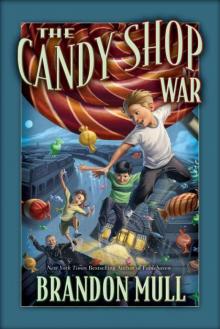 The Candy Shop War
The Candy Shop War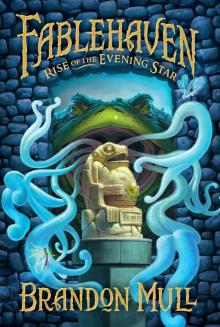 Rise of the Evening Star
Rise of the Evening Star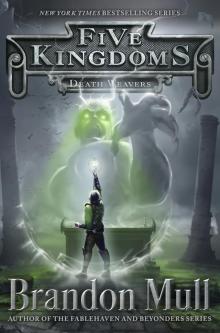 Death Weavers
Death Weavers The Candy Shop War, Vol. 2: Arcade Catastrophe
The Candy Shop War, Vol. 2: Arcade Catastrophe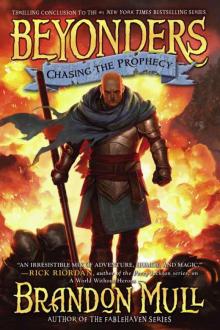 Chasing the Prophecy
Chasing the Prophecy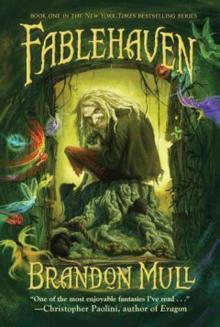 Fablehaven
Fablehaven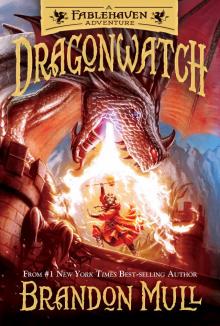 Dragonwatch
Dragonwatch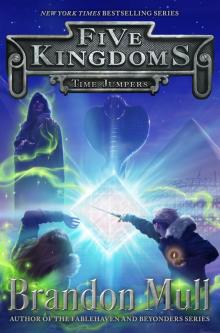 Time Jumpers
Time Jumpers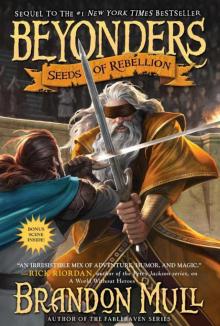 Seeds of Rebellion
Seeds of Rebellion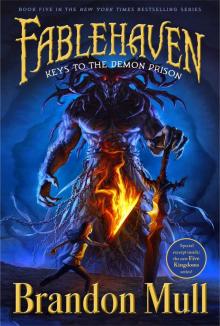 Keys to the Demon Prison
Keys to the Demon Prison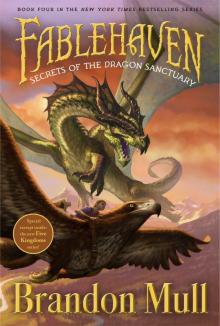 Secrets of the Dragon Sanctuary
Secrets of the Dragon Sanctuary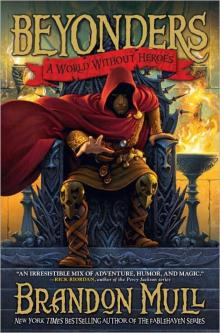 A World Without Heroes
A World Without Heroes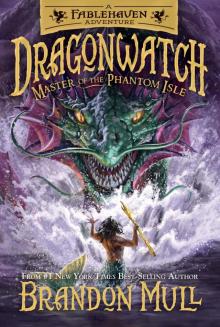 Master of the Phantom Isle
Master of the Phantom Isle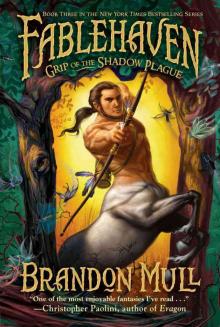 Grip of the Shadow Plague
Grip of the Shadow Plague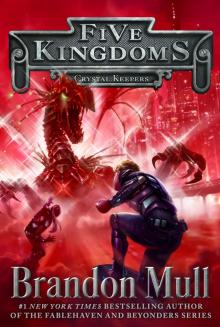 Crystal Keepers
Crystal Keepers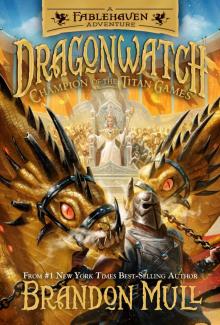 Champion of the Titan Games
Champion of the Titan Games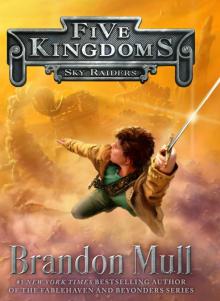 Sky Raiders
Sky Raiders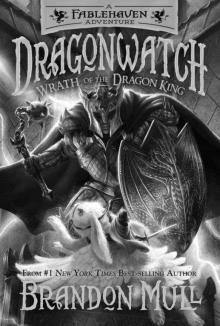 Dragonwatch, Book 2: Wrath of the Dragon King
Dragonwatch, Book 2: Wrath of the Dragon King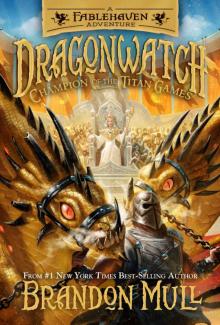 Dragonwatch, vol. 4: Champion of the Titan Games
Dragonwatch, vol. 4: Champion of the Titan Games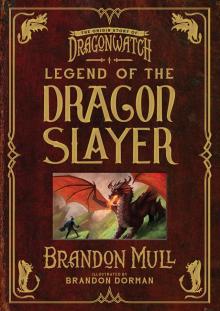 Legend of the Dragon Slayer
Legend of the Dragon Slayer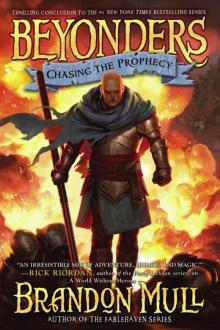 Chasing the Prophecy (Beyonders)
Chasing the Prophecy (Beyonders)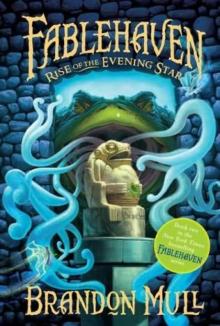 Fablehaven2-Rise of the Evening Star
Fablehaven2-Rise of the Evening Star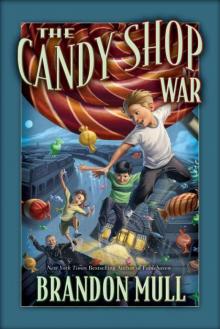 Candy Shop War
Candy Shop War Wild Born
Wild Born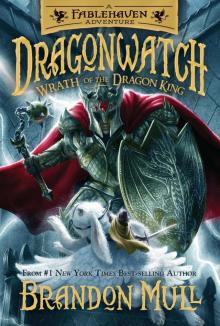 Wrath of the Dragon King
Wrath of the Dragon King Spirit Animals Book 1: Wild Born
Spirit Animals Book 1: Wild Born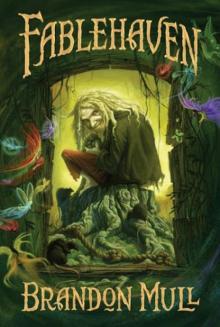 Fablehaven1-Fablehaven
Fablehaven1-Fablehaven Tales of the Fallen Beasts
Tales of the Fallen Beasts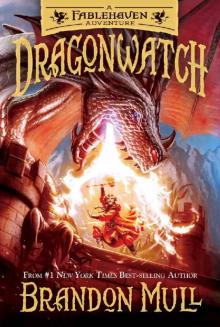 Dragonwatch: A Fablehaven Adventure
Dragonwatch: A Fablehaven Adventure Tales of the Great Beasts
Tales of the Great Beasts